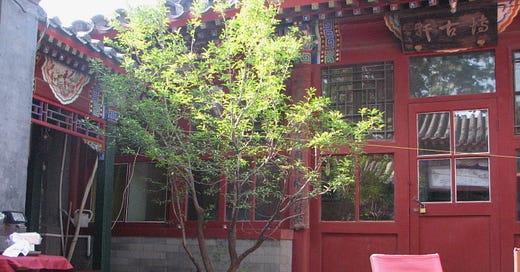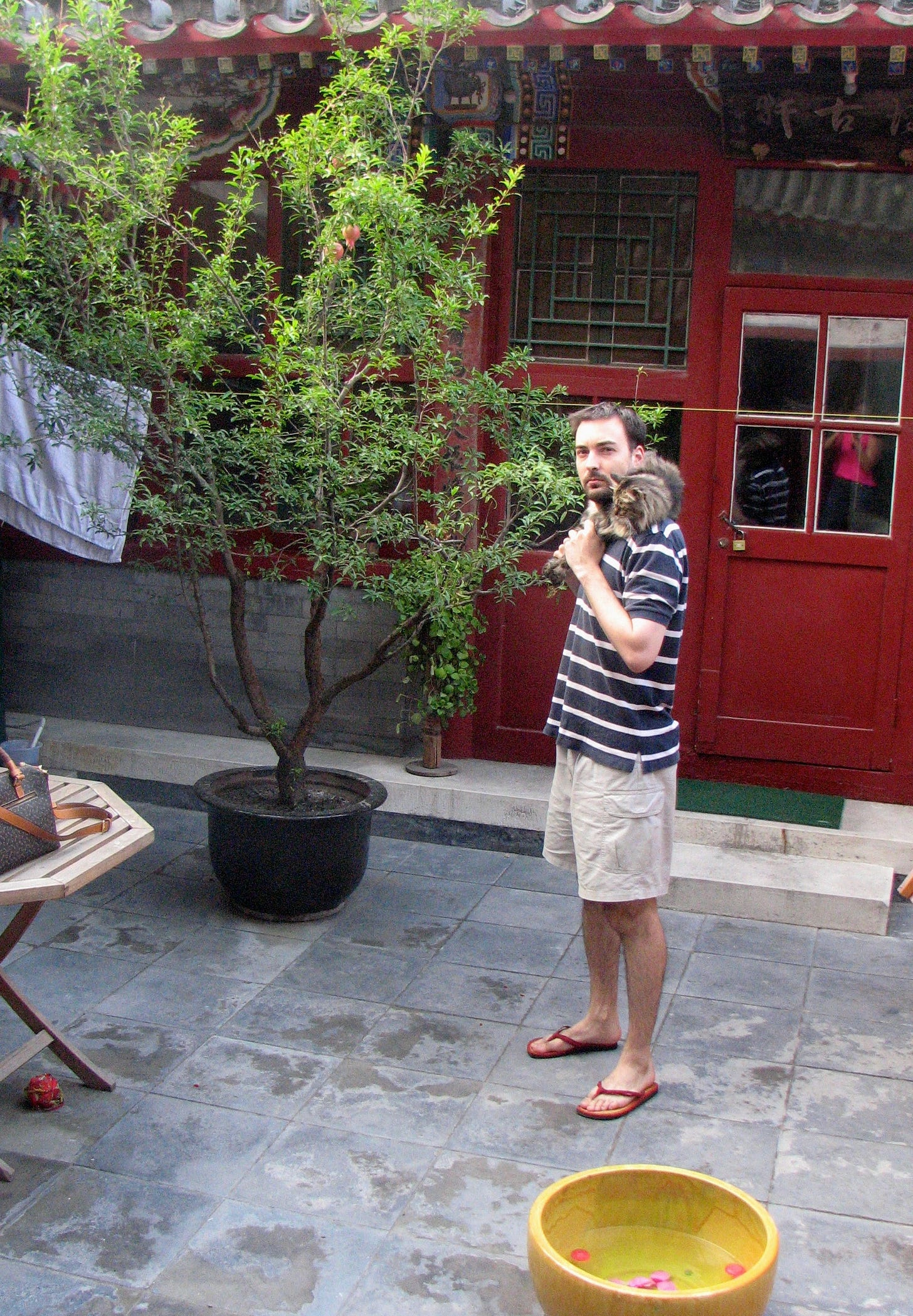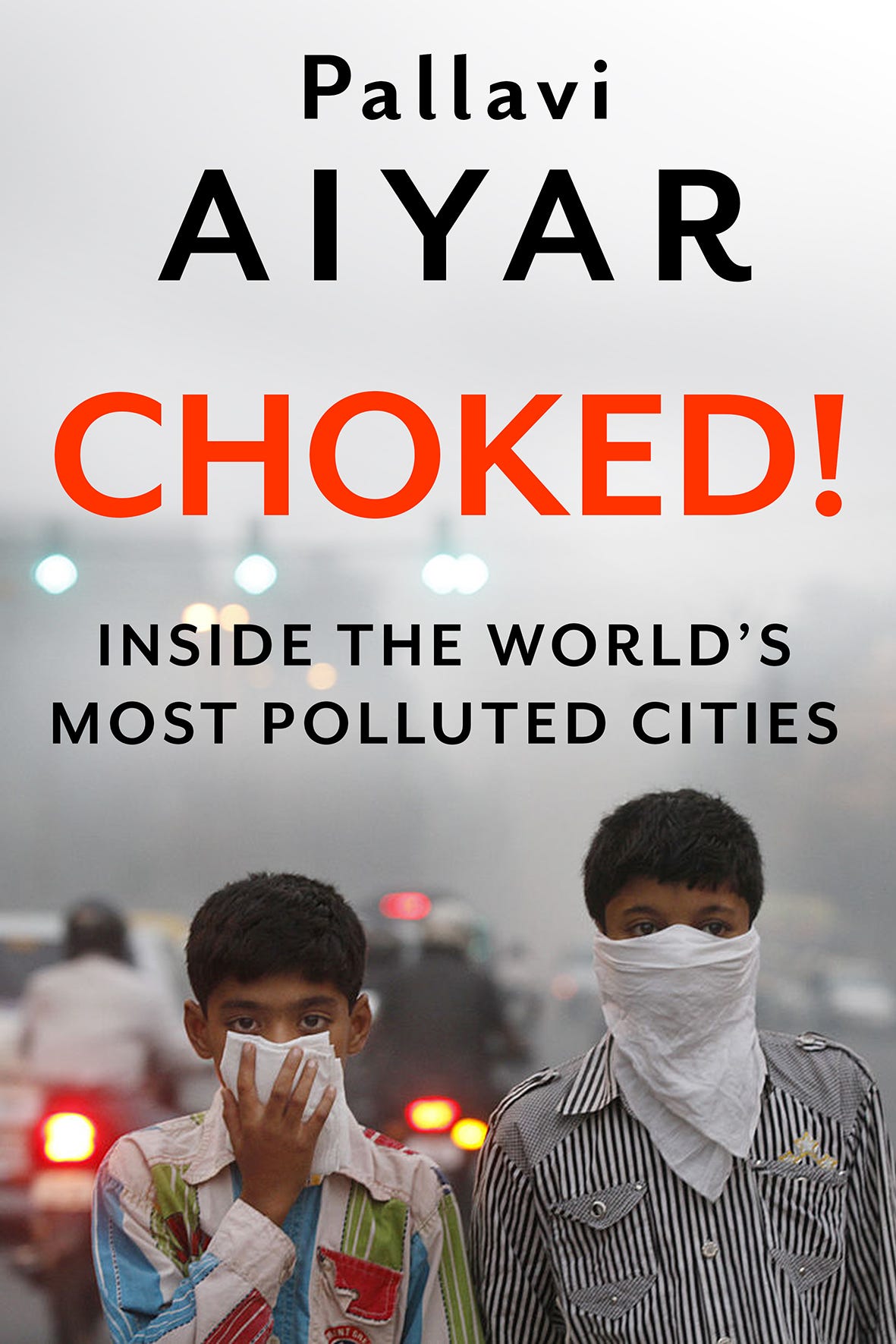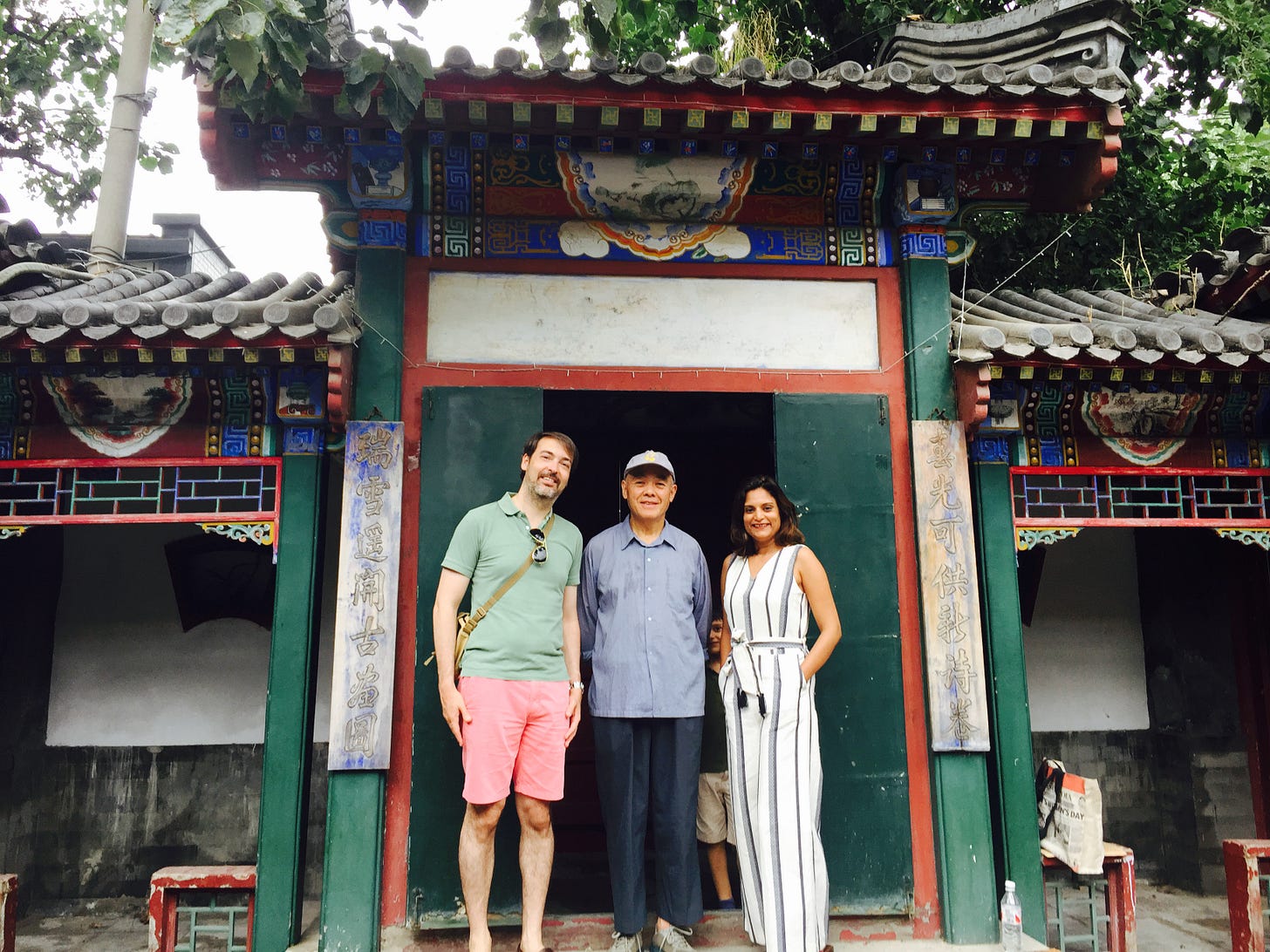Ni Hao Global Jigsaw,
We are just back from a fabulous trip to Greece. Meteora, in particular, was one of my all time favorite places to visit. It’s inspired me to do a future post on the top 10 best trips I’ve ever done. Lots of fodder for your future travels. It will only be available to paying subscribers, so there has never been a better time than to upgrade to paid, and help my fledgling publication along its way. Founding subscribers can message me for detailed itineraries, tips for hotels and restaurants, and hidden gems. The list will feature Kyoto in spring, tracking Komodo dragons in eastern Indonesia, and much more.
For now, on to today’s post, which is part of the my “humanizing China” in a demonizing China environment, series. Read on for an amazing story of serendipity:
Tofu the cat, in our Beijing courtyard home
A middle-aged woman in teddy bear-spangled pajamas came hurtling down on a flatbed tricycle. The smell – a mix of sewage and fried rice – coated the tiles of the homes that lined the alleyway. Two men stood at the back entrance to a restaurant slick with fish scales, sizing me up as they smoked. Their exposed bellies sagged over trousers rolled up to their knees. Summer in Beijing is hot.
It was so familiar that it hurt, like the sudden reminder of a missing limb. Ten years had passed since I’d called this central Beijing hutong my home. Returning to it was like revisiting a seminal version of my younger self. This time around I had a couple of appendages: my ten and seven year old boys. They’d grown up listening to stories from Beixin Qiao Tou Tiao hutong and were bubbling with questions: Is that Eraser, Old Lady Fang’s dog? Is that where Little Wang used to play with his pet crickets? Where’s the luxurious lavatory?
The toilet, once the star attraction of the alley, looked grimier than I remembered. It had caused a frisson of excitement, attracting gawkers from several hutongs away, upon its unveiling in 2006. In the run-up to the 2008 Beijing Olympic Games, the municipality had replaced many of the neighbourhood’s hole-in-the ground public facilities with high-tech wonders featuring automated flush commodes and toilet paper rolls.
The revamped loo emerged as the fulcrum of Beixin Qiao Tou Tiao’s social life. Children played outside it in the evenings, their parents seated on stools under an adjoining gingko tree. Heated games of xiangqi, a version of chess, went on late into the evening, lubricated by beer and greasy lamb skewers.
But on the morning of our visit the toilet was deserted, the heavy plastic curtains at its entrance looking sulky and forbidding. In a bid to re-enthuse our boys my husband pointed out the intricately carved gateways to some of the houses. The hutongs may look mouldy now, he explained, but these urban villages were amongst the last remaining links between modern Beijing and its layered past.
*
In imperial times the criss-crossing alleyways of hutong neighbourhoods were the quintessence of glamour. Wealthy families resided here in commodious, traditional-style courtyard homes called siheyuan. Complex family dramas played out within the high walls of these houses, with generations of the same family living under a single roof. Pomegranate trees heavy with jeweled fruit grew in the courtyards, servants cooked up feasts in detached kitchens, guests arrived from neighbouring cities astride spirited horses.
A playground of privilege, the hutongs were an obvious target as the Chinese Communist Party took power in 1949. The revolutionary zeal of the following years led to the summary expropriation of the majority of siheyuan, which were handed over to work units and allocated as accommodation to factory workers. Homes that had for centuries housed the elite were transformed into over-crowded dormitories, the fragrance of their fruit trees replaced with the odour of shared toilets.
But even though the hutongs had degenerated into slum-like conditions, they remained full of character and community. Crowded quarters forced people out on the streets, so that much of life was performed in public – the revelry outside Beixin Qiao Tou Tiao’s luxurious lavatory being a case in point.
Living in the hutongs had in some ways been reminiscent of my life in India, perhaps most obviously in the ability to mark time by the cries of itinerant vendors. The clackity-clack of the local knife-sharpener signaled lunchtime. In the late afternoons, the cries of the newspaper vendor rent the air: ‘Wanbao! Wanbao! Beijing Wanbao!’, ‘Beijing Evening News!’ In the winter there was the coal-briquette vendor and the candied-crab apple wallah. In spring, the ventilator cleaner cycled around offering his services in the aftermath of seasonal dust storms.
*
Finding a suitable house to live in – a modestly renovated siheyuan with a functional bathroom – had been tough. My husband and I had spent weeks bouncing between homes that were either too elaborate or too dilapidated. Having spent the morning at one prospective residence that had featured pink, crushed-velvet sofas, our will to keep looking had been nearly broken when we fetched up at the last house at the end of Beixin Qiao Tou Tiao.
We were instantly charmed. It was the perfect size for a couple, and the inner walls of the courtyard were painted in classical Chinese motifs. We’d decided to take the plunge and informed the poker-faced landlord, Mr Wu, to draw up a contract. It was the beginning of a wary and frustrating friendship.
Julio with our cat, Tofu, in our Beijing home circa 2006
Before signing on the dotted line we asked Mr Wu to install a heating system, something the siheyuan conspicuously lacked. He looked genuinely miffed, ‘But why do you need heating?’ he asked. ‘Um, because temperatures fall to minus fifteen in the winter,’. Mr Wu was unimpressed. ‘You can always wear more clothes.’
In the years that followed it often felt like we barely had a Wu-free moment. Our stay in the hutong became a saga starring our landlord as the unexpected protagonist. The plot line centered on his cost-cutting proclivities, his unannounced visits, and his extreme generosity.
Our charming new house had less-than-charming old plumbing, but every burst pipe or backed up commode received the personal attention of Mr Wu. We’d suggest the services of a professional only to be stopped short by the landlord’s raised hand. ‘No need,’ he’d say. ‘I am much better.’
A retired official of the Ministry of Railways, Mr Wu was enigmatic, but as we got to know him better, we put together bits of information to reach the startling conclusion that our bush shirt-wearing surrogate plumber was a millionaire. We discovered that he owned four courtyard houses in the choicest of Beijing locations. The going market rate for these in the early 2000s was around $3,800 per square metre, so that our courtyard alone was worth $760,000. (By 2015, the price range for a siheyuan had rocketed to between $11,000 − $39,000 US per square meter).
Mr Wu was born in 1946 into a wealthy merchant family. His ancestral home, a large courtyard house in the western part of Beijing, was taken over by the government after the Communist Revolution of 1949. He lived out the next decade in a dank, one-bedroom apartment. Branded a class enemy, he was eventually exiled to the Inner Mongolian countryside for ‘re-education’ through hard labour during the years of the Cultural Revolution.
In the early eighties Mr Wu returned to Beijing and was able to get a job at the Ministry of Railways, where he worked as a mid-level bureaucrat until he retired. With time on his hands, he took to walking around Beijing’s hutong neighbourhoods, scouting for a courtyard to be had on the cheap. The memory of his ancestral siheyuan had stayed with him through even the most difficult years in Inner Mongolia.
It wasn’t long before Mr Wu found one, and then three more. In the late 1990s few people wanted to live in hutongs and the lack of protection afforded to private property made the land even less valuable.
I learned much of this in gnomic nuggets of information that Mr Wu parted with over shared meals. On his frequent, odd-job visits to our home, the landlord often suggested eating out together. These feasts usually featured a smorgasbord of his wife, Mrs Wu’s, favourite dishes, from a chilly-garnished broth of pig lungs and kidneys, to bullfrog, stir fried with cashew nuts.
If facing down the food didn’t leave us wrung out, the post-dinner, bill-paying, slanging match did. No matter how much we tried to outfox him, Mr Wu was always first with his wallet.
On our last dinner together in early 2008, Mr Wu’s insistence on paying had involved some spectacular theatrics. Only a few minutes into the meal he claimed to have swallowed a morsel of frog the wrong way down and went into frightening convulsions. His wife pummeled his back, but he continued to choke and finally dashed to the washroom. We discovered later that it had been an elaborate ruse to preempt us from taking care of the bill. Instead of heading to the loo, he’d gone straight to the cashier.
To me, Mr Wu embodied many of modern China’s contradictions. Despite his hardscrabble youth, he was refined. His eyes lit up when he explained the subtle differences between the different styles of siheyuan doorways and how they indicated the social rank of the residents. He was wealthy, but he preferred to save money by fixing his tenants’ toilets himself. When he took us out for a meal, he always ordered lavishly. Yet Mrs Wu would carefully have every bit of leftover food packed in a take away bag to eat later at home.
*
In the ten years since I’d last seen Mr Wu, I have lived in Belgium, Indonesia and Japan. I had two children and written four books. I’d gained much, but also lost a few things, notably contact with my former landlord.
I left Beijing in pre-smartphone days. My dinky Nokia had all my China phone numbers stored in it and somewhere between the moves and babies, it disappeared. Facebook was banned in China, not that Mr Wu would have been on it anyway; for all practical purposes he was gone and I had little choice but to accept this as part of the collateral damage of my peripatetic condition.
The Wu-less years skipped along, until a moment of serendipity in early 2016. I’d been asked to write a monograph on Beijing’s fight against air pollution and what lessons Delhi might glean from it. Sitting in my study in Jakarta, I was Googling the various kinds of devices used to monitor air quality, when I read about the ‘laser egg.’ This was a hand-held gadget, about the size of an orange, that had become an essential handbag item for the pollution-concerned Beijing mom.
(https://thewire.in/environment/beijing-delhi-pollution-choked)
I visited the website of Origins Technology, the start-up behind the egg, and was stopped short by a familiar image: a photograph of our Beixin Qiao Tou Tiao courtyard. Could it be? I found confirmation on the contact page, which listed the same address as our Beijing home’s. In the company storyline there was this entry under the year 2016:
Origins is growing fast and our team works out of a beautiful courtyard in central Beijing, which we call the Breathing Space. When the weather (and air) is good, we sit in the sunshine and design cool new products to improve the lives of our users and the environment around us.
Within minutes I was deep in an exclamation mark-heavy tweet exchange with the company’s office manager. ‘You currently work out of my old house! And I discovered this while working on my own book on air pollution! It must be yuan fen, fate!’
The reply was quick: ‘This is the coolest thing that has ever happened on twitter!! We renovated the courtyard last year and now it has become our office. Just to make sure it is the same place . . . it’s at the very end of the hutong street, near the public washrooms?’
It was.
I tweeted back asking for news of Mr Wu. How was he? But my laser egg respondent said she had never met the landlord, although her boss had. I asked her to pass on my best wishes to him somehow, perhaps through her boss. He’d know me by my Chinese name, Ai Bei, I made sure to tell her. I didn’t hear from Origins Technology again.
*
More than two years later, in 2018, we walked past the teddy bear-pajama tricyclist, the exposed bellies of the smokers and the formerly luxurious lavatory, until we faced our old house. My husband and I wanted to show our children this once-intimate geography; for them to experience the home we’d lived in unshackled by parenthood. And we wanted them to meet Mr Wu.
But, there had been no way of contacting him and I was resigned to just letting the children have a wander in the hutong, taking in the siheyuan from the outside. The lacquered red of the doors to our former home had lost some of its shine and the lion-faced brass knockers looked worn-out too. But, the canopy of the tree just outside the entrance remained as capacious as I remembered. Its leaves rustled pleasantly. The boys looked at me quizzically. Was this it?
It couldn’t be. This story had been a decade in the making – it needed a stronger conclusion. I lifted the knocker and rapped on the door. There was no answer. I’d checked online and was aware that Origins Technology had rebranded and moved to another location. It felt cheeky to be knocking when some other family probably lived here now. I didn’t imagine they’d be thrilled at an unheralded visit from a random Indian woman and her brood.
We were about to walk away when abruptly, the door yanked open. ‘Shei? Who is it?’ demanded Mr Wu looking irate, but otherwise untouched by the years. His familiar bush shirt was untucked over a pair of baggy trousers. We stared at each other for just a moment before he swept my husband into a quick hug, as though he’d been expecting us. ‘Come in,’ he said, ‘Come in and wait a few minutes. I’m negotiating a lease with a new tenant.’
Reunited with Mr Wu, our landlord
He glanced at the boys and without further comment scurried away to the living room at the far side of the courtyard. The potential tenant was a well-dressed Chinese woman with a long ponytail and a sour expression that only seemed to curdle further when she peered out of the windows at us.
Left to our own devices, we stood in the centre of the courtyard. It was familiar, yet off-kilter. The cat flap we’d installed in the door to the kitchen was gone. The wall that had separated the living room from the master bedroom had been knocked down. The yard looked unkempt, fallen leaves lay unswept.
We walked around gingerly, shushing the children, who were wide-eyed and skittish. ‘Is this the best house you ever lived in?’ asked Ishaan. ‘Can we move to China and live here forever?’ Nico chimed in.
About fifteen minutes later, Mr Wu emerged with the lady behind him. ‘Look at them!’ he commanded, pointing at us. We flashed her our most enticing smiles. ‘I’ve always had the best relationship with my tenants. We love each other so much they’ve come all the way from Indonesia to see me.’
‘How do you know we were in Indo–’ I began to ask, but was preempted by Mr Wu’s signature raised hand. The lady looked us up and down, sour-face unchanged and said, ‘Nice to meet you.’ ‘You too!’ I replied gushingly. ‘This is a wonderful house. We loved it. You’ll love it.’ ‘Hmm,’ she said. And with a ‘Let’s talk again, Old Wu,’ she marched off and out into the alley.
We watched her depart in silence and then turned to Mr Wu. ‘So, should we go for lunch?’ he smiled. ‘But, I don’t like Chinese food,’ whined Nico. ‘You’re such a loser,’ snapped Ishaan. ‘My children,’ I beamed, shoving the boys forward by their shoulders.
‘Very nice,’ Mr Wu said cautiously before returning to his favourite subject. ‘So, would you like some bullfrog? I remember you really loved that.’ My husband and I protested that it was only mid-morning and we’d had a late breakfast. ‘How about a cup of coffee?’ I suggested.
‘Coffee?’ he echoed dubiously. ‘I suppose so. But where’s good? Where’s expensive?’ We decided to walk down Beixin Qiao Tou Tiao to the main thoroughfare by the Lama Temple, one of Beijing’s most popular tourist destinations. There was bound to be a coffee shop in the vicinity.
As we walked he told us that the Origins Technology people had in fact passed on my greetings, which is how he knew we’d been in Indonesia. ‘Are you sure you don’t want to get some lunch?’ he added. I remembered why I’d found the man so infuriating.
*
The coffee shop we found was very hip, all plush sofas and pendant lighting. A man with a wispy goatee peered into a Macbook in one corner. Mr Wu surveyed the scene and turned to us. ‘You’re sure you wouldn’t like the bullfrog instead?’
When we finally managed to maneuver him to a seat, he began ordering manically. Hot chocolate for the boys. Did they want milkshakes too? My children looked at our former landlord with new affection. He bulldozed all protest and called for an assortment of cakes and ice creams in addition to the hot chocolates. My husband and I sank deeper into our seats, feeling drained of any control.
Ordering done, Mr Wu took out his phone and a moment later was bellowing into it: ‘Yes, its Ai Bei and Hu Liao, come to see us from Indonesia.’ He handed me the handset. ‘Speak to her,’ he urged. It was Mrs Wu.
‘Hello?’ I ventured, wishing I’d been better with keeping up my Chinese. Mrs Wu babbled excitedly for ages and all I could properly grasp was that she was readying herself to jump in a taxi to come and see us. It took some effort to dissuade her, but she proved more pliable than her spouse. I felt wretched making our excuses but we did need to be elsewhere very soon.
On learning about our time constraints, Mr Wu urged the boys to eat up, so he could get them seconds. We tried to distract the landlord from any further ordering by asking him about his family. He replied somewhat reluctantly. His son, whom we’d met as a youngster, was now married, but remained unemployed. He’d had some kind of accident, which made it difficult for him to work, Mr Wu explained, but he didn’t meet our eyes.
Little Wu, as his father referred to him, had been a typical Little Emperor, an overindulged only child. On the few occasions he accompanied his parents to our home, Little Wu had lounged about on the hammock chair in the courtyard, making no attempt to help his father fix whatever needed repair.
Our rental contract with the landlord was actually in Little Wu’s name and it had seemed to us even then, that the boy would be living off his father’s efforts. He’d been in his mid-twenties at the time and his parents told us he was studying English. They would urge him to practice with us, but he never did. ‘Oh Little Wu is a shy boy,’ Mrs Wu would explain, in clear embarrassment at his inability, or unwillingness.
It was awkward to say any more about the boy and the conversation drifted to our lives in Indonesia and Japan. Mr Wu listened to us talking about our rich experiences in these countries without comment. When we were done he took a sip of his coffee and said, ‘Good. But maybe now you should come back to China. I’ll give you three months free rent, if you do.’
There was nothing more that Mr Wu could have said to demonstrate his affection. Rent was serious business for this man. We exchanged numbers and I helped him insert our contact details in his WeChat address book. Then Mr Wu settled the bill. There was no debate.
As we walked a little way down the road to flag a taxi, I turned back for a last look. Mr Wu was standing outside the coffee shop, mopping the sweat off his forehead with a giant hanky. He caught my eye and raised a hand. ‘Man zou, go slowly’ he said.
*****
I hope you enjoyed this story. Do share it and as usual, comments are very welcome. Hasta pronto!








What a beautiful story, thank you (from Australia)
Lovely bit of nostalgia Pallavi! Thank youi enjoyed it veyry much